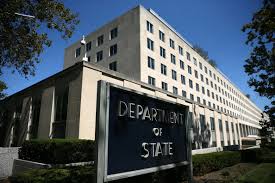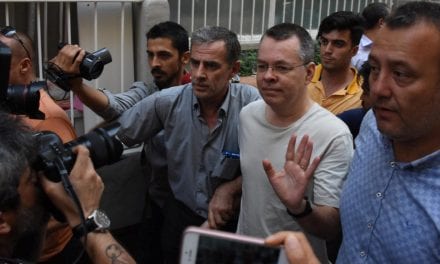The dust should have settled on the July 16 meeting between U.S. President Donald Trump and his Russian counterpart Vladimir Putin in Helsinki, but many Americans still feel they don’t know what transpired. Trump and his underlings maintain nothing much did, but Russian officials have been suggesting ever since that this isn’t quite true.
At the post-summit press-conference, no agreements, even tentative ones, were announced, and no joint statement was signed. But Trump and Putin spoke alone, with only translators present, for two hours. No official readouts were released, so some Democratic legislators even moved to subpoena Trump’s translator to describe what he heard; Republicans blocked this as inappropriate.
That made Russian officials’ multiple allusions to dogovoryonnosti (which describes a weak form of agreement, an understanding or arrangement) achieved at the summit all the more tantalizing.
Konstantin Kosachev, head of the international affairs committee at the Russian parliament’s upper chamber, even used the stronger word soglasheniya, or accords, along with dogovoryonnosti, as he suggested their implementation was in doubt:
“If there’s no doubt that the Russian side is willing and able to implement the results of this summit,” Kosachev said, “there are such doubts about the American side, and they have nothing to do with what President Trump wants or doesn’t want to achieve. They have to do with his ability to implement these accords, which is, in my view, severely limited by the U.S. Congress and many U.S. agencies, not to mention the special services.
Carried by the Kremlin’s official agencies, more hints of dogovoryonnosti came from the Defense Ministry and, on at least two occasions, Anatoly Antonov, the Russian ambassador to Washington. Putin himself told Russian diplomats on July 19 that the summit “was generally successful and led to useful understandings.”
The Defense Ministry and Antonov (who spoke of “important oral understandings” between Putin and Trump) expressed an intention to act on what was agreed. The ambassador, with whom U.S. officials have been reluctant to meet, promised to “start knocking on doors” in Washington “to get a final understanding of what specifically we should do together to implement the arrangements, the ideas that the two presidents supported.”
All the innuendo predictably produced some nervous reactions in the U.S., especially since dogovoryonnosti was universally translated as “agreements” in U.S. media. Steven Pifer, a veteran of the U.S. Foreign Service, wrote for the Brookings Foundation:
The problem remains that Americans do not know what agreements were reached in Helsinki. They could be good or bad. The Trump administration should fix this as soon as possible by disclosing what the president agreed to at the summit. Until it does, given the obsequious manner in which Trump deals with Putin, the White House should not be surprised that so many assume the worst.
While there is no Russian readout describing the understandings, leaks about what was discussed indicate there wasn’t much Russia or the U.S. could actually implement.
Putin proposed holding a referendum in eastern Ukraine to determine its status, but Trump couldn’t buy it because he knows — or at least his advisers do — that Ukraine won’t accept such a solution until Russia stops aiding separatists in the region and they lay down arms. Syria came up, but both Putin and Trump had already reached separate understandings with Israeli Prime Minister Benjamin Netanyahu about keeping Iranian troops away from the Israeli border, and there was nothing else the sides could agree on. Arms control was mentioned, and Putin and Trump appeared to agree that they have no major objections to extending existing agreements, including New Start — but any specific decisions on this would require some better-prepared negotiations.
Given how little backing Trump has for making any serious progress with Putin — there’s even a new, post-Helsinki pushfor augmenting Russia sanctions — the U.S. president has no way to act on any unspecific oral understandings. Trump doesn’t have the power to sign any modern version of a Molotov-Ribbentrop Pact handing over part of Ukraine to Putin or make secret deals to hand over U.S. officials to Russia to be tortured into confessing to trumped-up charges.
Even if he actually signed something, there would have been a backlash, followed by a retreat. In this toxic atmosphere, Trump is reduced to admitting that nothing happened at the summit while simultaneously insisting that it was successful. He did just that in a July 23 tweet:
When you hear the Fake News talking negatively about my meeting with President Putin, and all that I gave up, remember, I gave up NOTHING, we merely talked about future benefits for both countries. Also, we got along very well, which is a good thing, except for the Corrupt Media!
On the same day, his press secretary Sarah Sanders said that “the only specific agreement that was made was that the two national security teams from both the United States and Russia would continue at a working level, these discussions.” That would fit the nebulous Russian statements, too — but it’s more specific, because, unlike the Russians, Trump isn’t interested in playing the innuendo game.
The reason neither Russia nor the U.S. is releasing any details on their understandings is that there’s nothing to release. The Russians, from Putin on down it seems, have been messing with Americans’ minds, teasing them, making them paranoid. As Kosachev said, it’s clear to them that even if Trump wanted a breakthrough, he was effectively hemmed in. Under these circumstances, all they can do is troll Americans, including Trump, by stressing Washington’s internal strife and making the president look impotent.
The Russian-U.S. relations aren’t at their lowest point ever, as Trump said before the summit; they’ve been worse and they’re headed for worse, regardless of Trump’s or Putin’s personal sympathies and goals. There’s no reason for Putin to be optimistic, but he appears determined to enjoy the ride by making it as uncomfortable for Americans as possible.


















